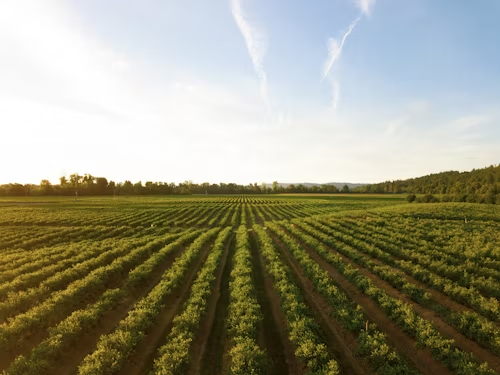Joel: Dr Owen?
Dr Owen: Come in, Joel. Right, so how's your research going? You're looking at how farmers feel about new technology in agriculture, aren't you?
Joel: Well, actually, it's more general than that. I'm looking at their attitudes to a variety of new developments in agriculture.
Dr Owen: OK. Have you got a title for the project yet?
Joel: I was thinking of something simple, like "Farmers Attitudes Towards the Adoption of New Farming Practices".
Dr Owen: Hmm, that's possibly a bit too general. I think the title needs to be a bit more specific. What kind of farming will you be looking at?
Joel: Well, that'll vary, actually. But I want to speak to each of the ten farmers in my sample. So I've chosen farms which are all in the same region.
Dr Owen: 1OK. Well, I'd specify where they are, then.
Joel: Right. I'll amend the title to do that.
Dr Owen: OK. Is there any particular reason why you've decided to do face-to-face interviews? It'll be quite time-consuming, won't it?
Joel: Yes, and I did consider doing telephone interviews for that reason, especially as it's unnecessary for me to actually see the places where they work. 2It's just that, in my experience, a lot of farmers don't like talking on the phone. So they'll be more likely to talk freely if I see them in person.
Dr Owen: Yes, you're probably right. Good.
Joel: Then the first thing I want to investigate is how the farmers actually find out about new developments in agriculture that they might want to adopt, what sources they use.
Dr Owen: Right. So how are you going to do this?
Joel: Well, I could make a checklist of sources of information for them to look at in advance, so they could tick off the ones they actually use. Things like farming magazines, farm product advertisements, television and the internet and so on.
Dr Owen: It might be more useful to ask them rather than show them a list. 3A spontaneous response to one or two open questions might give you a more accurate picture.
Joel: 3All right, I'll do that then.
Dr Owen: Now, talk me through some of the other issues you want to cover.
Joel: Well, there's the way the government communicates with farmers.
Dr Owen: Right. Well, 4one thing is farmers complain that the government sends out the same information to all of them, whether they're poultry farmers or dairy farmers or arable farmers.
Joel: 4So they get all this information, but half of it doesn't actually apply to them.
Dr Owen: 4Exactly. So you could look at that.
Joel: Right. Then I wanted to look at attitudes of British farmers to the cost of making any changes on their farms. 5According to articles I've read, farmers in Britain aren't in principle against investing money in new machinery and new practices, but they're actually just too busy to work out what the financial implications are.
Dr Owen: Yes, and a lot of them don't seem to consider getting financial advice from their accountants about it either.
Joel: Right.
Dr Owen: There's also been some research in Australia on sheep rearing practices. I can give you the reference, if you like. 6Basically, it appears that the majority of Australian sheep farmers are willing to risk adopting new practices on the basis of just a few pieces of research. They don't usually wait until the evidence, in failure of the changes, is overwhelming. They're quite happy to act before then, so they can get ahead of the game.
Joel: OK. I'll take a look at that. Thanks.
Joel: We said we'd also look at some of the reading material I've been reviewing.
Dr Owen: Yes. I had another look at Contemporary Farming Manual, which is clearly bang up to date. It covers a lot of things a farmer might want to know, but it's so dull.
Joel: 7Oh, absolutely. I found it really hard going. And I can't imagine any farmer wading through it. There aren't even any decent pictures.
Dr Owen: Did you have time to look at Running a Small Farm?
Joel: Yes, 8although I only read bits of it because, despite being entertaining, it wasn't very academic.
Dr Owen: I know. And a lot of the information is either misleading or simply wrong. I'm surprised it got published at all. I don't imagine the farming press will rate it very highly.
Joel: Hmm. 9You recommend Agriculture and Economics. I expected that it would be really difficult. The title's a bit off-putting. But I thought it was brilliant, so I've bought it.
Dr Owen: Yes. Some people think it relies too heavily on farming practices in specific parts of the world. But the theories that underpin these are universal. And that's why it's a required textbook for anyone studying agriculture.
Joel: Right.
Dr Owen: What else did you come across?
Joel: 10I borrowed How to Survive in Farming from the library. I thought it'd be an interesting background, and I liked the informal style. But it turned out to have been written years ago.
Dr Owen: Yes. And like everything else, farming fashions have changed. So it's badly in need of a new edition.
Joel: Can I ask you a question about what...

![[Forecast Q2-2025] - Biology lecture](https://static.helik.app/reading/8fd3d7d2-ccf9-47a3-8920-2e7a3b0d6607)
![[Forecast Q2-2025] - Living in the City](https://static.helik.app/reading/1a60bcf3-f3a7-4e9b-97a2-94d156a0de3b)
![[Forecast Q2-2025] - Student Union](https://static.helik.app/reading/fb443123-8c1d-447e-8c79-5a01650f4754)
![[Forecast Q2-2025] - Fruit-picking Job in an Orchard](https://static.helik.app/reading/e1968346-6c55-44ae-b8d3-f6a4fb7207b9)
![[Forecast Q2-2025] - University Crime Prevention](https://static.helik.app/reading/bdda593e-16d6-4c72-8a12-b116e917b27c)
![[Forecast Q2-2025] - Business Course](https://static.helik.app/reading/3308e282-99a6-4bcb-9d22-0b488701d968)
![[C20T1] - Choosing a restaurant](https://static.helik.app/reading/e9b21123-c43c-42fb-88b7-5d0be3a37e03)
